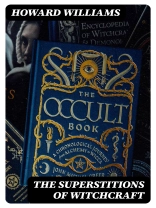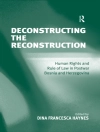In ‘The Superstitions of Witchcraft, ‘ Howard Williams delves into the intricate tapestry of folklore, beliefs, and rituals surrounding witchcraft across diverse cultures. Employing a meticulous blend of historical research and anthropological insights, Williams examines how superstitions play a crucial role in the societal understanding of witchcraft. His analytical yet evocative literary style invites readers to explore the depths of fear, fascination, and the sometimes thin line between superstition and belief that has prevailed through centuries. This work sheds light on the contextual significance of witchcraft in both historical and contemporary societies, exploring how these beliefs inform social dynamics and cultural narratives. Howard Williams, a distinguished scholar with a background in anthropology and cultural studies, has long been fascinated by the interplay of belief systems and societal norms. His extensive research into marginalized traditions and folklore has shaped his understanding of witchcraft’s enduring influence on human psychology and societal structure. Williams’ passion for uncovering the stories behind various cultural practices reflects his commitment to preserving the voices often overshadowed in mainstream historical discourse. This book is essential reading for anyone interested in the intersections of culture, belief, and history. Williams’ profound insights and rigorous scholarship make ‘The Superstitions of Witchcraft’ not only an informative text but also a compelling narrative that will engage scholars, students, and general readers alike. Join Williams on this fascinating journey through the shadowy corridors of superstition and discover the rich, often perilous, world of witchcraft.
About the author
Howard Williams, notable largely for his exploration into the beliefs and customs surrounding witchcraft, was a writer whose contributions to the study of folklore and the occult remain of scholarly interest. His prominent work, ‘The Superstitions of Witchcraft, ‘ published in the 19th century, examines the historical and sociological aspects of witchcraft, seeking to shed light on the superstitions prevailing in different societies and epochs regarding the practice. Although not as widely recognized as some of his contemporaries, Williams’ treatment of the subject is characterized by a meticulous dissection of the rationale behind witchcraft-related fears and legal persecutions. His book delves into the intricate web of folklore, social norms, and judicial actions, offering a window into how such superstitions were ingrained in the cultural psyche and oftentimes manipulated for various ends. Williams’ literary style is analytical and incisive, indicative of a keen understanding of both historical context and human psychology as it pertains to supernatural beliefs. His work stands as a testament to an enduring fascination with the esoteric and provides a reflective commentary on the consequences of fear-driven social phenomena.












